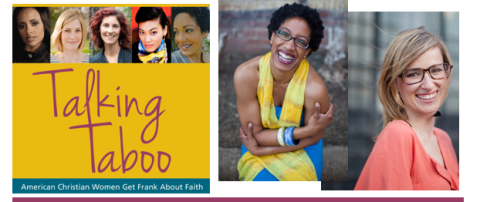Erin Lane and Enuma Okoro: Talking Taboo

I’ve been interested in the idea of “taboos” for a long time—those intricate rules that overarch our society and ideas of the sacred. Cultures use taboos tools to keep people from harming others or themselves. They can also be a form of social conditioning, arbitrarily enforcing certain behaviors as a means of control.
Some taboos were in place because we believed that a supernatural event would occur if we broke them. It’s still the case. It’s a common joke. When people move furniture in the sanctuary, and a man stubs his toe, he mutters a curse, and everyone looks up, expecting lightening bolts to fry the place.




